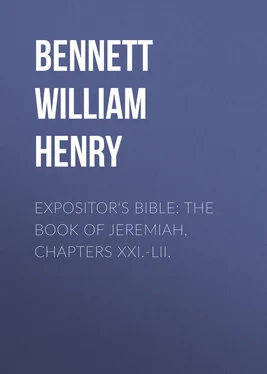William Bennett - Expositor's Bible - The Book of Jeremiah, Chapters XXI.-LII.
Здесь есть возможность читать онлайн «William Bennett - Expositor's Bible - The Book of Jeremiah, Chapters XXI.-LII.» — ознакомительный отрывок электронной книги совершенно бесплатно, а после прочтения отрывка купить полную версию. В некоторых случаях можно слушать аудио, скачать через торрент в формате fb2 и присутствует краткое содержание. Издательство: Иностранный паблик, Жанр: foreign_religion, foreign_antique, foreign_prose, на английском языке. Описание произведения, (предисловие) а так же отзывы посетителей доступны на портале библиотеки ЛибКат.
- Название:Expositor's Bible: The Book of Jeremiah, Chapters XXI.-LII.
- Автор:
- Издательство:Иностранный паблик
- Жанр:
- Год:неизвестен
- ISBN:нет данных
- Рейтинг книги:5 / 5. Голосов: 1
-
Избранное:Добавить в избранное
- Отзывы:
-
Ваша оценка:
- 100
- 1
- 2
- 3
- 4
- 5
Expositor's Bible: The Book of Jeremiah, Chapters XXI.-LII.: краткое содержание, описание и аннотация
Предлагаем к чтению аннотацию, описание, краткое содержание или предисловие (зависит от того, что написал сам автор книги «Expositor's Bible: The Book of Jeremiah, Chapters XXI.-LII.»). Если вы не нашли необходимую информацию о книге — напишите в комментариях, мы постараемся отыскать её.
Expositor's Bible: The Book of Jeremiah, Chapters XXI.-LII. — читать онлайн ознакомительный отрывок
Ниже представлен текст книги, разбитый по страницам. Система сохранения места последней прочитанной страницы, позволяет с удобством читать онлайн бесплатно книгу «Expositor's Bible: The Book of Jeremiah, Chapters XXI.-LII.», без необходимости каждый раз заново искать на чём Вы остановились. Поставьте закладку, и сможете в любой момент перейти на страницу, на которой закончили чтение.
Интервал:
Закладка:
The warlike spirit of classical antiquity and of Teutonic chivalry welcomed a glorious death upon the field of battle: —
"And how can man die better
Than facing fearful odds,
For the ashes of his fathers,
And the temples of his Gods?"
No one spoke of Leonidas as a victim of Divine wrath. Later Judaism caught something of the same temper. Judas Maccabæus, when in extreme danger, said, "It is better for us to die in battle, than to look upon the evils of our people and our sanctuary"; and later on, when he refused to flee from inevitable death, he claimed that he would leave behind him no stain upon his honour. 83 83 Macc. ii. 59, ix. 10.
Islam also is prodigal in its promises of future bliss to those soldiers who fall fighting for its sake.
But the dim and dreary Sheôl of the ancient Hebrews was no glorious Valhalla or houri-peopled Paradise. The renown of the battle-field was poor compensation for the warm, full-blooded life of the upper air. When David sang his dirge for Saul and Jonathan, he found no comfort in the thought that they had died fighting for Israel. Moreover the warrior's self-sacrifice for his country seems futile and inglorious, when it neither secures victory nor postpones defeat. And at Megiddo Josiah and his army perished in a vain attempt to come
"Between the pass and fell incensed points
Of mighty opposites."
We can hardly justify to ourselves Jeremiah's use of Josiah's reign as an example of prosperity as the reward of righteousness; his contemporaries must have been still more difficult to convince. We cannot understand how the words of this prophecy were left without any attempt at justification, or why Jeremiah did not meet by anticipation the obvious and apparently crushing rejoinder that the reign terminated in disgrace and disaster.
Nevertheless these difficulties do not affect the terms of the sentence upon Jehoiakim, or the ground upon which he was condemned. We shall be better able to appreciate Jeremiah's attitude and to discover its lessons if we venture to reconsider his decisions. We cannot forget that there was, as Cheyne puts it, a duel between Jeremiah and Jehoiakim; and we should hesitate to accept the verdict of Hildebrand upon Henry IV. of Germany, or of Thomas à Becket on Henry II. of England. Moreover the data upon which we have to base our judgment, including the unfavourable estimate in the Book of Kings, come to us from Jeremiah or his disciples. Our ideas about Queen Elizabeth would be more striking than accurate if our only authorities for her reign were Jesuit historians of England. But Jeremiah is absorbed in lofty moral and spiritual issues; his testimony is not tainted with that sectarian and sacerdotal casuistry which is always so ready to subordinate truth to the interests of "the Church." He speaks of facts with a simple directness which leaves us in no doubt as to their reality; his picture of Jehoiakim may be one-sided, but it owes nothing to an inventive imagination.
Even Renan, who, in Ophite fashion, holds a brief for the bad characters of the Old Testament, does not seriously challenge Jeremiah's statements of fact. But the judgment of the modern critic seems at first sight more lenient than that of the Hebrew prophet: the former sees in Jehoiakim "un prince libéral et modéré," 84 84 iii. 269.
but when this favourable estimate is coupled with an apparent comparison with Louis Philippe, we must leave students of modern history to decide whether Renan is really less severe than Jeremiah. Cheyne, on the other hand, holds 85 85 P. 142.
that "we have no reason to question Jeremiah's verdict upon Jehoiakim, who, alike from a religious and a political point of view, appears to have been unequal to the crisis in the fortunes of Israel." No doubt this is true; and yet perhaps Renan is so far right that Jehoiakim's failure was rather his misfortune than his fault. We may doubt whether any king of Israel or Judah would have been equal to the supreme crisis which Jehoiakim had to face. Our scanty information seems to indicate a man of strong will, determined character, and able statesmanship. Though the nominee of Pharaoh Necho, he retained his sceptre under Nebuchadnezzar, and held his own against Jeremiah and the powerful party by which the prophet was supported. Under more favourable conditions he might have rivalled Uzziah or Jeroboam II. In the time of Jehoiakim, a supreme political and military genius would have been as helpless on the throne of Judah as were the Palæologi in the last days of the Empire at Constantinople. Something may be said to extenuate his religious attitude. In opposing Jeremiah he was not defying clear and acknowledged truth. Like the Pharisees in their conflict with Christ, the persecuting king had popular religious sentiment on his side. According to that current theology which had been endorsed in some measure even by Isaiah and Jeremiah, the defeat at Megiddo proved that Jehovah repudiated the religious policy of Josiah and his advisers. The inspiration of the Holy Spirit enabled Jeremiah to resist this shallow conclusion, and to maintain through every crisis his unshaken faith in the profounder truth. Jehoiakim was too conservative to surrender at the prophet's bidding the long-accepted and fundamental doctrine of retribution, and to follow the forward leading of Revelation. He "stood by the old truth" as did Charles V. at the Reformation. "Let him that is without sin" in this matter "first cast a stone at" him.
Though we extenuate Jehoiakim's conduct, we are still bound to condemn it; not however because he was exceptionally wicked, but because he failed to rise above a low spiritual average: yet in this judgment we also condemn ourselves for our own intolerance, and for the prejudice and self-will which have often blinded our eyes to the teachings of our Lord and Master.
But Jeremiah emphasises one special charge against the king – his exaction of forced and unpaid labour. This form of taxation was in itself so universal that the censure can scarcely be directed against its ordinary and moderate exercise. If Jeremiah had intended to inaugurate a new departure, he would have approached the subject in a more formal and less casual fashion. It was a time of national danger and distress, when all moral and material resources were needed to avert the ruin of the state, or at any rate to mitigate the sufferings of the people; and at such a time Jehoiakim exhausted and embittered his subjects – that he might dwell in spacious halls with woodwork of cedar. The Temple and palaces of Solomon had been built at the expense of a popular resentment, which survived for centuries, and with which, as their silence seems to show, the prophets fully sympathised. If even Solomon's exactions were culpable, Jehoiakim was altogether without excuse.
His sin was that common to all governments, the use of the authority of the state for private ends. This sin is possible not only to sovereigns and secretaries of state, but to every town councillor and every one who has a friend on a town council, nay, to every clerk in a public office and to every workman in a government dockyard. A king squandering public revenues on private pleasures, and an artisan pilfering nails and iron with an easy conscience because they only belong to the state, are guilty of crimes essentially the same. On the one hand, Jehoiakim as the head of the state was oppressing individuals; and although modern states have grown comparatively tender as to the rights of the individual, yet even now their action is often cruelly oppressive to insignificant minorities. But, on the other hand, the right of exacting labour was only vested in the king as a public trust; its abuse was as much an injury to the community as to individuals. If Jeremiah had to deal with modern civilisation, we might, perchance, be startled by his passing lightly over our religious and political controversies to denounce the squandering of public resources in the interests of individuals and classes, sects and parties.
Читать дальшеИнтервал:
Закладка:
Похожие книги на «Expositor's Bible: The Book of Jeremiah, Chapters XXI.-LII.»
Представляем Вашему вниманию похожие книги на «Expositor's Bible: The Book of Jeremiah, Chapters XXI.-LII.» списком для выбора. Мы отобрали схожую по названию и смыслу литературу в надежде предоставить читателям больше вариантов отыскать новые, интересные, ещё непрочитанные произведения.
Обсуждение, отзывы о книге «Expositor's Bible: The Book of Jeremiah, Chapters XXI.-LII.» и просто собственные мнения читателей. Оставьте ваши комментарии, напишите, что Вы думаете о произведении, его смысле или главных героях. Укажите что конкретно понравилось, а что нет, и почему Вы так считаете.












